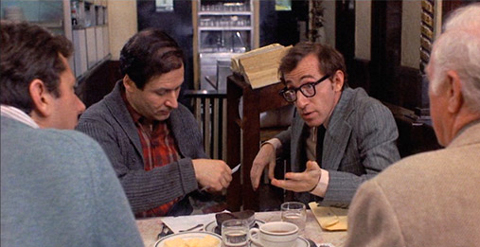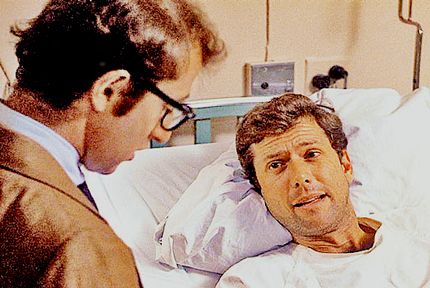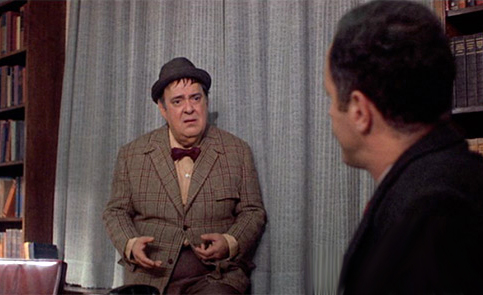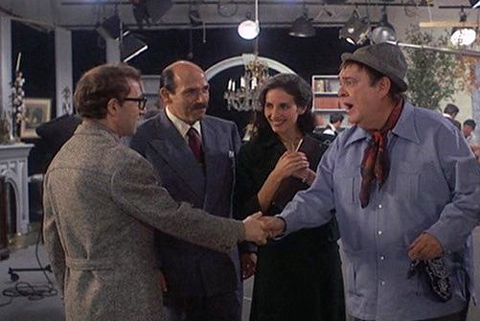|
|
Reviewed by Glenn Erickson
An interesting acting departure for Woody Allen, this beautifully judged comedy-drama from 1976 is perhaps the only really successful movie about the notorious Blacklist era. Critics incensed about the lack of public knowledge or interest in the HUAC and McCarthy witch hunts voiced their displeasure that Martin Ritt and Walter Bernstein's The Front wasn't more incisive, accusatory and comprehensive about the scope and harm done by the Blacklist. I instead compare The Front to a Sidney Poitier movie -- it is the strongest movie that the general public would accept on the subject. As most Americans stay away from the messy details of political controversy, the non-threatening The Front wisely sets up the absurdity of the witch hunts and allows viewers to become curious on their own. For interested parties, it's a short step from this entertainment to the docu Point of Order, actor Robert Vaughn's book Only Victims and the moving, damning truth to be found in interview-driven works like Tender Comrades. As with Poitier and the Civil Rights issues, the public apparently needs to take anything socially challenging by baby steps.
Most of what's written about the Blacklisting era concerns big stars, writers and producers, like the Hollywood Ten. The news coverage of the recent passing of Pete Seeger made mention of his 'Blacklist' problem, when the fact is that the F.B.I. and the State Department harassed any performer that made social criticism or labor activism part of their performance. Through publications like Red Channels, for-profit "loyalty companies" put pressure on commercial sponsors to ban popular performers from TV and radio. In some cases the government stepped in to revoke passports of targeted individuals, preventing them from making a living in Canada or overseas. But thousands of law-abiding citizens in all walks of life also saw their lives ruined. Teachers and professors were dismissed with no way to appeal their 'invisible Blacklisting'. If denounced by a colleague, someone in insurance or broadcasting could lose their entire livelihood. When the news is full of hysterics claiming that government bureaucracies and even the military are 'infiltrated' by Red traitors, who will listen to a schoolteacher who once supported a politically unpopular cause?
Nowhere was the bite of the Blacklist felt stronger than in the new profit center of New York television, where so much money was being made that nobody wanted to rock the boat. Just like witchfinders from the Inquisition of old, the loyalty companies helped the networks purge their ranks of undesirables, on the basis of old affiliations, hearsay and innuendo. Deprived of his career for years, screenwriter Walter Bernstein packs The Front with autobiographical details, including his own ulcers. It's all true. In a major subplot, actor-comedian Zero Mostel recreates real incidents that happened to him personally.

Deli cashier and bookmaker Howard Prince (Woody Allen) is approached by his old friend Al Miller (Michael Murphy), a successful pro TV writer who suddenly cannot get a job. Will Howard put his untarnished name on Al's scripts so they can be sold to the networks? All Howard need do is pretend to be a writer, attend a few meetings and turn in Al's final scripts, in exchange for ten percent of the writing fees. Jumping at the opportunity to earn some real money, Howard starts working as Al's "front". He soon has a girlfriend in production assistant Florence Barrett (Andrea Marcovicci), who is impressed by "his" writing talent. Howard also begins fronting for Al's friends Delaney and Phelps (Lloyd Gough & David Margulies). The ex-bookie foolishly begins to believe that he's part of the creative process, rather than just a necessary inconvenience. He becomes aware of the grave injustice of what is happening only when his new friend comic performer Hecky Brown (Zero Mostel) is blacklisted and can find no way to squirm out from under the implacable, pitiless Red-hunters at the "Freedom Information Service". And then it finally happens -- detectives connect Howard to the three blacklisted writers... and the witch hunt turns on him as well.
The Front is always amusing, yet Walter Bernstein's script grows darker as Howard Prince develops a conscience about what's going on around him. At first a happy opportunist with dollar signs in his eyes, he turns into something of a minor predator in his own right, adding insult to injury when he starts critiquing his friends' work. But things become sticky when the show's producer (Herschel Bernardi) shoves him into a room to do a quick rewrite of a script -- Howard is like the girl in Rumpelstiltskin, suddenly asked to spin a pile of straw into gold. If The Front were told in a gritty NYC style like that found in Sweet Smell of Success, it might be difficult to watch. We can easily imagine a shark like Tony Curtis' Sidney Falco playing his friends' predicament for all it is worth. The writers would be turning out shallow, optimistic pap for TV dramas, while engaged in a grim existential struggle.

The pressure of this precarious situation so affects Michael Murphy's Al Miller that he winds up in the hospital over his ulcer. Florence is disgusted when her superiors at the TV studio treat the Blacklist opportunists as something to be appeased at any cost. Professional cowardice is the order of the day. Once the hex is in against Hecky Brown, he becomes persona non grata. The socially oriented Hecky dies inside when former glad-handing associates and employers suddenly turn their heads away at his approach. It's as if the popular performer no longer exists.
Zero Mostel's performance puts average Supporting Oscar nominees to shame -- it's both brilliant and heartbreaking. The Borscht Belt comedian adds a touch of nuttiness to the movie, but also illuminates the tragedies experienced by some Blacklistees. The Hecky Brown character is based partly on Mostel's own experiences, especially an incident in which he shows up to perform at a Catskills resort, and is then cheated of half his fee simply because the sleazy proprietor knows that Hecky needs the money and has no choice but to accept what is offered. The balance of Hecky's story is borrowed from that of actor Philip Loeb, who was labeled as a communist for his union activities, and unceremoniously dropped from the cast of his enormously popular TV show, The Goldbergs. (I go into more detail on the tragic Mr. Loeb in my review of the documentary Yoo Hoo, Mrs. Goldberg.)

Immersed in his own films, Woody Allen took this acting-only assignment because he believed in the subject matter and respected the filmmakers. It was our first opportunity to see Woody in non-clown mode, in a serious role. Allen is wonderful -- this is probably his only screen character that isn't undercut with comic detachment. Howard Prince grows from a position of willful ignorance to taking a stand for common decency and loyalty to his friends. The only righteous path is to resist the Congressional committee, the Freedom Information Service and all their corrupt minions.
It's telling that The Front lands right between Allen's comedy Love and Death and his breakout seriocomic hit Annie Hall. Director Martin Ritt's no frills direction resembles Woody's own later style. Directorially speaking, the only difference I caught is that Martin Ritt frequently overhangs dialogue and audio across scene transitions. The screenplay shrewdly sets up the 1953 context with a montage of newsreel footage -- Marilyn Monroe, Joe McCarthy, the atomic spies the Rosenbergs -- set off against the innocent ballad Young at Heart sung by Frank Sinatra. The uplifting conclusion with Howard a hero in handcuffs is perfectly acceptable, even though few if any Blacklist victims experienced anything so positive. Essayist Julie Kirgo cites the Sinatra song again: "Fairy tales can come true".
Viewers already conscious of the Blacklist get their valentine in the end credits, where several actors and creatives are listed by name and the year they were blacklisted: Martin Ritt, Zero Mostel, Herschel Bernardi, Lloyd Gough, Joshua Shelley. Actor Lloyd Gough has the distinction of being blacklisted before a big Technicolor film was released in which he played a major role. Howard Hughes and RKO solved that problem by having Gough's name and character removed from the cast list.

Twilight Time's Blu-ray of The Front is a perfect encoding of this entertaining favorite. I've previously seen it only flat on cable viewings, and Michael Chapman's widescreen images are very handsome.
Composer Dave Grusin's work has its own Isolated Score Track. An original trailer is present as well. I listened to and enjoyed the commentary with actress Andrea Marcovicci and Twilight Time's Nick Redman and Julie Kirgo. Ms. Kirgo's engaging essay presents plenty of interesting information, such as the fact that the three blacklisted writers were meant to be based on Walter Bernstein, Abraham Polonsky and Arnold Manoff.

It's nice to see Woody Allen play a genuine moral hero for once; his committee testimony that finishes the film is a fine piece of work with only the slightest comic payoff. I recommend that readers check out the courageous and daring real testimony of actor Lionel Stander, as recorded in Eric Bentley's eye-opening book Thirty Years of Treason: Stander feeds the squares questioning him some really effective double-talk as well as sound arguments why their Inquisition is a farce. He doesn't name names. As can be expected, the actor was put on the list of un-friendlies and "informally" stripped of his right to practice his profession.
On a scale of Excellent, Good, Fair, and Poor,
The Front Blu-ray rates:
Movie: Excellent
Video: Excellent
Sound: Excellent
Supplements: Isolated Music Score, commentary, trailer, Julie Kirgo insert essay.
Deaf and Hearing Impaired Friendly?
YES; Subtitles: English
Packaging: Keep case
Reviewed: March 8, 2014

Text © Copyright 2014 Glenn Erickson
See more exclusive reviews on the Savant Main Page.
Reviews on the Savant main site have additional credits information and are often updated and annotated with reader input and graphics.
T'was Ever Thus.
Return to Top of Page
|

